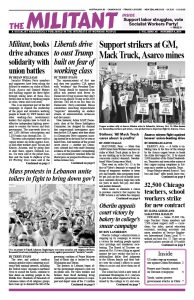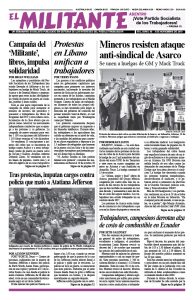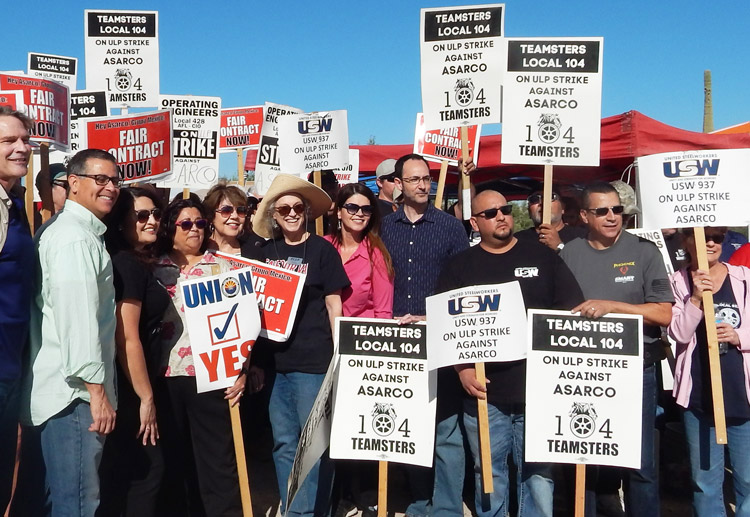KEARNY, Ariz. — A battle is unfolding here in the face of the attempt by the Asarco copper bosses to break the strike that began Oct. 13 by almost 2,000 members of the United Steelworkers, Teamsters and seven other unions at four copper mining complexes in Arizona and a smelter in Amarillo, Texas.
Grupo Mexico-owned Asarco’s “last, best and final” offer would leave two-thirds of the workers who’ve been without a pay raise in nearly a decade with four more years of a wage freeze, and would more than double their health insurance expenses. The workers have been working without a contract since the end of 2018. Asarco didn’t answer the Militant’s request for comment.
Asarco bosses are campaigning to convince workers to cross the picket lines and resign from the union. Strikers are picketing around the clock and are winning solidarity.
Copper workers have a proud history of standing up to the mine bosses in Arizona going back more than a century. A hard-fought three-year battle against union-busting concessions demanded by Phelps Dodge began in 1983. The strike was lost when the bosses brought in strikebreakers and decertified the union, and the government sent in hundreds of National Guard, state troopers and SWAT sharpshooters.
Over 100 strikers and their supporters held a rally Oct. 19 at the Mission mine in Sahuarita. “Anywhere you go in this world, if you don’t fight you’re going to lose,” said United Steelworkers Sub-District 2 Director Manny Armenta.
Alex Terrazas, a working miner at the Mission complex and USW Local 937 president, told the rally, “We can’t afford higher insurance for families. You know it feels like we’re being punished for having families.”
The picket lines are stocked with food, water and other supplies, much of it from workers, truck drivers, small-business people and even hunters who stop by to give aid and solidarity or to picket for a while.
“This is our first strike. Our fathers fought it for us and now we’re fighting it for future generations,” 21-year-old Miguel Estrada, who has worked at the Ray mine for a year, said on the picket line Oct. 19.
Wes Oswald, a teacher and part of a delegation from the Tucson Education Association, told Militant worker-correspondents Oct. 18 at the picket line in Sahuarita that “during our walkout a year ago — the Red for Ed walkout — there were many unions supporting us. It’s important we support them.”
“A lot of local stores and restaurants have donated food to help us get through this,” Illias Romero, who has worked at the Ray mine for two years, said Oct. 19. “It’s cool to see the communities pull through for us.”
Small number crossed picket line
Asarco has succeeded in getting a small number of workers to cross the picket lines at the Ray and Hayden complexes near Kearny and at the Mission mine. Strikers say that most of the 100 workers at the Silver Bell mine — the smallest of Asarco’s facilities — have crossed. But the strike remains strong, forcing Asarco to close down smelters in Hayden and in Amarillo, Texas.
“Any employees who wish to continue working are welcome to report to Ray or Mission where they will be considered for any available openings,” Asarco wrote workers Oct. 18. It added that if workers resign from the union “the Union is legally required to represent you the same as anyone else.”
Workers on the picket lines told the Militant how they stepped up efforts to strengthen union consciousness even before the strike started.
Mission mine heavy equipment operator Robert Kershner, 31, said while picketing there Oct. 17 that he spoke to co-workers who were considering scabbing. “I explained why we were striking and they said they had a lot of bills and a family to feed. I told them I also have a lot of bills and a family to feed but I’m striking for a better future for my family.”
“I was 8 when my dad went on strike,” heavy equipment operator Monica Badillo said. “My dad taught me, ‘Never cross a picket line.’ We lost our car, but when it was all over we bought another one.”
“We tell new workers the reason you have ear plugs, steel toes, hard hats and other safety equipment is because the union fought for it,” added Raul Romero. Five generations of his family have worked in Arizona mines or in smelters.
Send letters of solidarity or contributions to help the fight to USW Local 915, P.O. Box 550, Kearny, AZ 85137.
Deborah Liatos is a rail worker and member of SMART-TD Local 1544.


